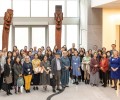| New Studies Show Huge Health Disparities Among Asian American, Native Hawaiian and Asian Immigrant P |
| Bostonkorea 2010-03-22, 15:40:35 |
|
Critical Avenues to Prevent Cancer Overlooked; Immigrant Women at High Risk of Death from Breast Cancer
WASHINGTON (U.S. ASIAN WIRE) -March 18, 2010 -Although Asian Americans have long been portrayed as a "model minority" with few major problems, data released online today in the American Journal of Public Health (AJPH) reveal that distinct groups of Asian Americans, Native Hawaiians, and Pacific Islanders (AA and NHPI) differ widely in death and disease rates, including from breast cancer and other conditions such as heart disease, and stand to benefit strongly from culturally appropriate care. In the first issue of a major health journal devoted to AA and NHPI populations, data show striking disparities. For instance, some Asian-born women in the United States suffer death rates from breast cancer up to four times as high as their U.S.-born counterparts. Other studies show that culturally appropriate care would dramatically lower rates of lung, colorectal, cervical and liver cancers among distinct populations. The special issue was supported by Health Through Action, a partnership between APIAHF and the W.K. Kellogg Foundation. "Information, not ignorance, must shape the health care agenda for our populations," said Kathy Lim Ko, president and CEO of the Asian & Pacific Islander American Health Forum (APIAHF). "Aggregated data across ethnic groups masks serious health problems. Cancer often goes unrecognized and undertreated. We must move beyond generalities to address the real health needs in diverse communities," she said. The problem has taken a serious toll on groups such as Native Hawaiians. As author Stephen Stafford at the Montefiore Medical Center in New York points out, while Asian American adults as a group are 50 percent less likely to die from heart disease than non-Hispanic White adults, Native Hawaiians and Pacific Islanders are about 40 percent more likely to be diagnosed with heart disease than Whites. Obesity is as another health risk facing Native Hawaiians. Compared to whites in the state, Native Hawaiians are twice as likely to be obese (44.1 percent vs. 21.3 percent). But, culturally appropriate care can decrease such disparities. A new study by Shannon Kapuaola Gellert at Na Pu`uwai, a Native Hawaiian Health Care System, documented success in reducing obesity and high blood pressure among Native Hawaiians in Moloka`i, 73 percent of whom are overweight or obese. The program incorporated Hawaiian values and concepts of healthy lifestyle, and stressed community involvement. "Large minority groups in the United States have benefited from in-depth health surveys, but such data are largely unavailable for Native Hawaiians, Pacific Islanders and the numerous, widely varying ethnic groups that are collectively termed Asian Americans," said U.S. Representative Judy Chu (D-CA). "It's time for health data regarding our populations to enter the 21st Century." Since 2000, the Asian American population has grown by more than 23 percent, making it the fastest growing racial group in the country. In the same time period, the Native Hawaiian and Pacific Islander community, which is almost a million strong, has grown by more than 13 percent. If these rapid growth trends continue, AA and NHPIs are expected to number well over 35 million by 2050. Asian Americans, Native Hawaiians and Pacific Islanders trace their heritage to more than 50 countries and to dozens of distinct ethnic groups, speaking a multitude of languages. "We know that income, education, access to health care, and language barriers all influence health," said Dr. Gail C. Christopher, vice president for programs at the W.K. Kellogg Foundation. "Raising awareness of these issues and the lack of data, particularly for Asian Americans, Native Hawaiians, and Pacific Islanders, is instrumental to the W.K. Kellogg Foundation's focus on increasing health equity for vulnerable children and families across the country." |
 |
 의견목록 [의견수 : 0]
의견목록 [의견수 : 0]
|
 |
| 등록된 의견이 없습니다. | |
|
|
 프리미엄 광고
프리미엄 광고

161 Harvard Avenue, Suite 4D, Allston, MA 02134
Tel. 617-254-4654 | Fax. 617-254-4210 | Email. editor@bostonkorea.com
Copyright(C) 2006-2018 by BostonKorea.com All Rights Reserved.
Designed and Managed by Loopivot.com

























